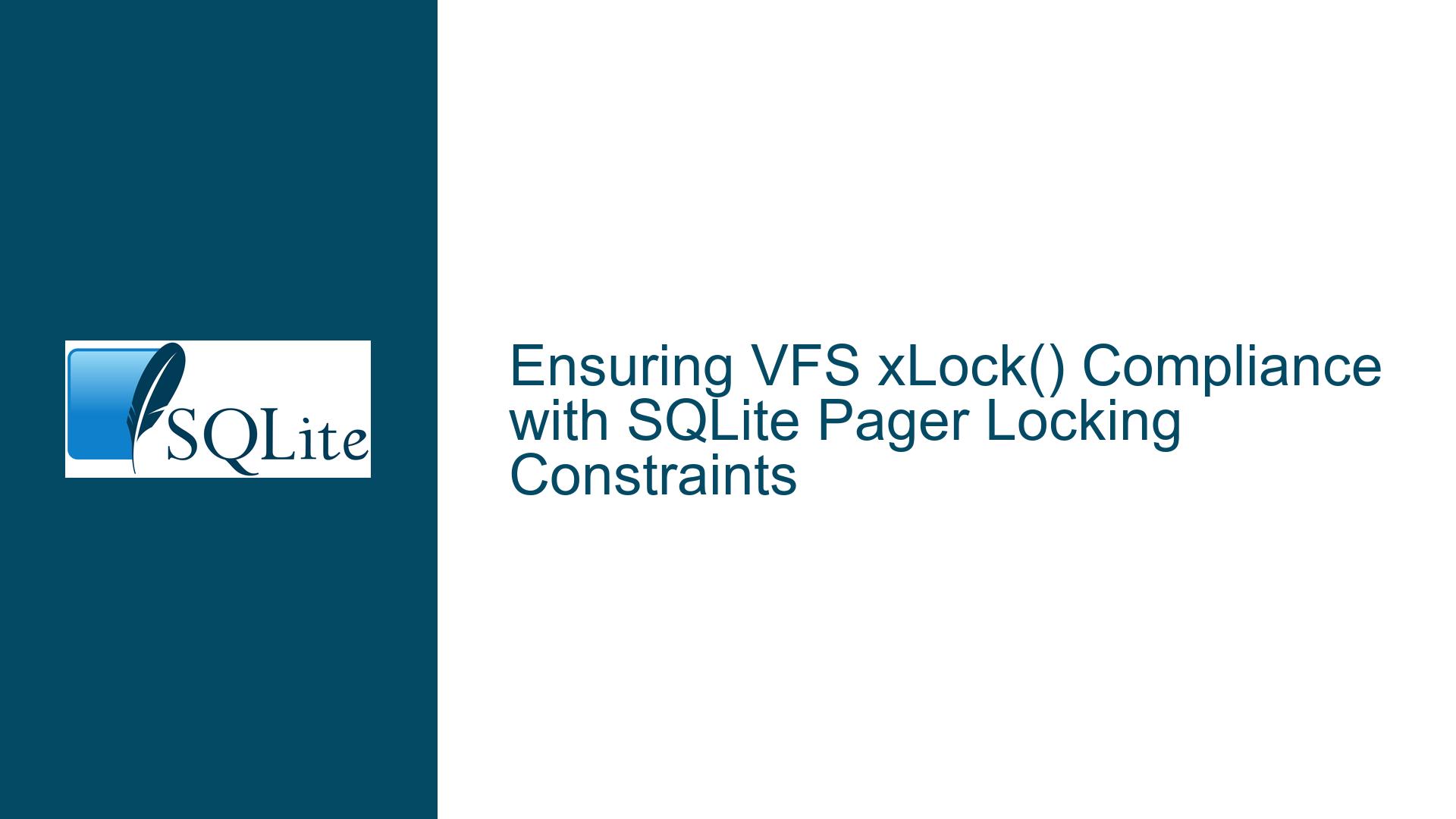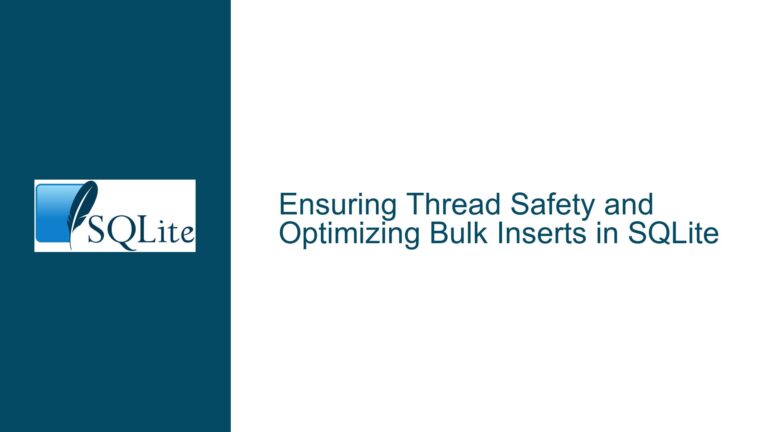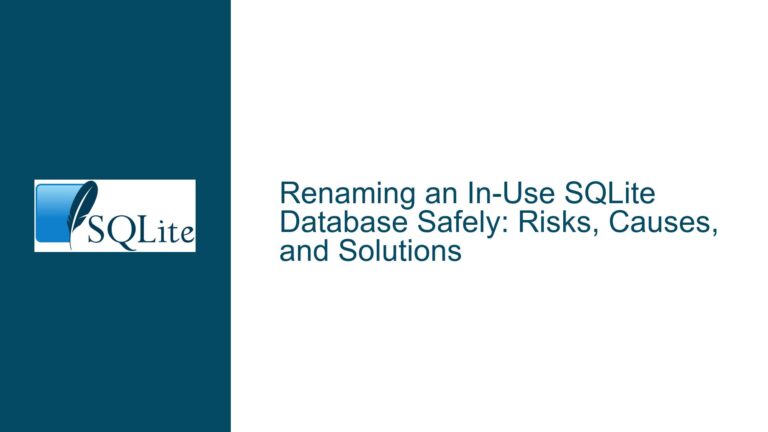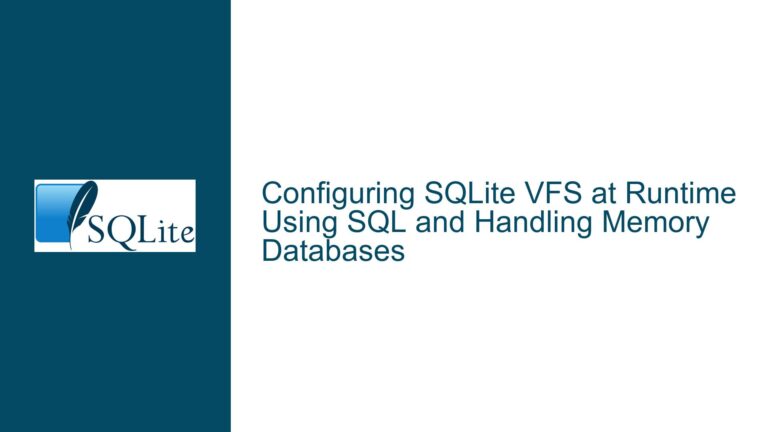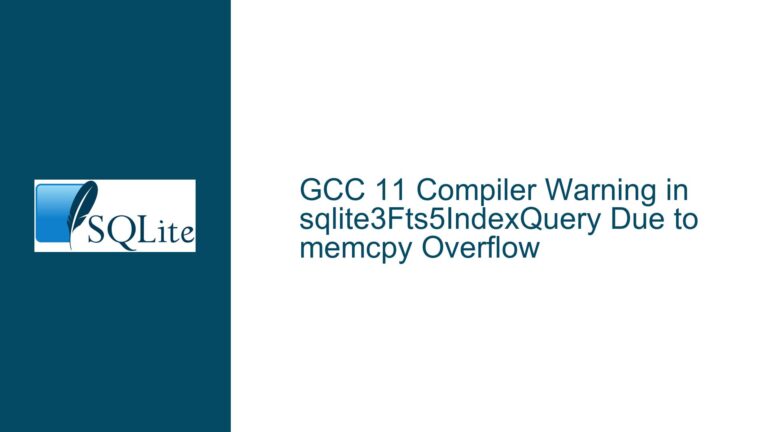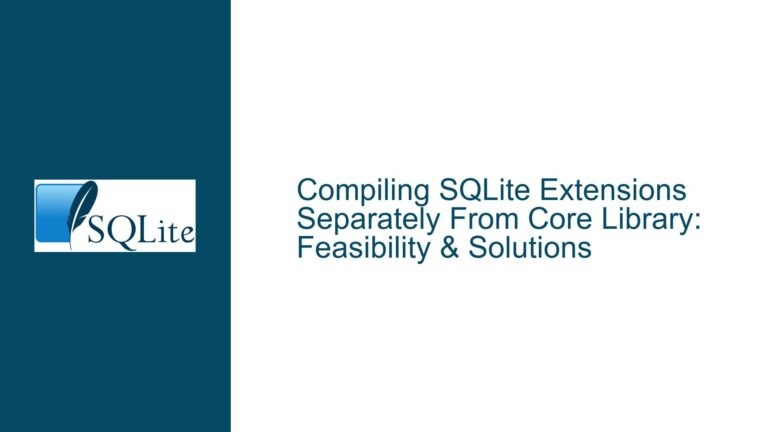Ensuring VFS xLock() Compliance with SQLite Pager Locking Constraints
Understanding SQLite VFS xLock() and Pager Locking State Transitions
The SQLite Virtual File System (VFS) layer is responsible for abstracting low-level file operations, including locking mechanisms. A critical component of this layer is the xLock() method, which manages file locks to ensure transactional integrity. The os_unix.c source file includes assertions that enforce specific constraints on lock transitions, such as prohibiting direct transitions from NO_LOCK to locks stronger than SHARED_LOCK, disallowing explicit requests for PENDING_LOCK, and requiring a SHARED_LOCK before acquiring a RESERVED_LOCK. These constraints, while not explicitly documented in the SQLite Locking Documentation, are enforced in the Unix VFS implementation. However, ambiguity arises when custom VFS implementations must determine whether these constraints are part of the formal VFS API or are implementation-specific to os_unix.c.
The core issue revolves around whether VFS developers can rely on these constraints as guaranteed behavior. For example, if a custom VFS assumes that SQLite’s pager module will never request a PENDING_LOCK, but this assumption is not codified in official documentation, it risks introducing race conditions or lock conflicts. Similarly, the requirement that a RESERVED_LOCK can only be acquired while holding a SHARED_LOCK is critical for preventing invalid state transitions. Misinterpreting these constraints could lead to assertion failures in debug builds or silent data corruption in release builds.
The SQLite documentation clarifies that the pager module tracks four lock states (NO_LOCK, SHARED_LOCK, RESERVED_LOCK, EXCLUSIVE_LOCK) but does not track PENDING_LOCK. This implies that the pager will never explicitly request a PENDING_LOCK, but the documentation does not explicitly prohibit VFS implementations from handling it. The os_unix.c assertions enforce stricter rules, raising questions about whether these rules are universally applicable to all VFS implementations or are merely optimizations for Unix-like systems.
Root Causes of VFS xLock() Constraint Violations
Undocumented Assumptions in the Pager Module
The SQLite pager module manages page caching and transactional atomicity. Its interactions with the VFS layer assume specific lock state transitions, such as acquiring aSHARED_LOCKbefore escalating to aRESERVED_LOCK. However, these assumptions are not fully enumerated in the public documentation. A VFS implementation that bypasses theSHARED_LOCKrequirement (e.g., transitioning directly fromNO_LOCKtoRESERVED_LOCK) may violate the pager’s internal state machine, leading to undefined behavior.Misinterpretation of Lockingv3 Documentation
The SQLite Locking Documentation describes lock states and compatibility but does not prescribe the exact sequence of lock transitions. Developers might incorrectly infer that the absence of explicit prohibitions allows arbitrary transitions. For instance, the documentation states that the pager does not trackPENDING_LOCK, but it does not clarify whether the VFS is allowed to use it. This ambiguity can lead to VFS implementations that handlePENDING_LOCKin ways conflicting with the pager’s expectations.Overreliance on os_unix.c as a Reference
The os_unix.c implementation serves as a template for many custom VFS implementations. Its assertions act as runtime checks for lock transitions, but these checks are not part of the formal VFS interface. Developers who treat os_unix.c’s behavior as authoritative might inadvertently introduce platform-specific logic into cross-platform VFS implementations. For example, a Windows VFS that mirrors os_unix.c’s assertions might fail to account for differences in file locking APIs.Inconsistent Handling of PENDING_LOCK
ThePENDING_LOCKstate is a transitional lock that allows existingSHARED_LOCKholders to continue while blocking newSHARED_LOCKrequests. The pager’s lack of tracking forPENDING_LOCKmeans it will never explicitly request this state, but the VFS might still encounter it in multi-process environments. If a custom VFS assumes the pager will handlePENDING_LOCKinternally, it might fail to escalate locks properly, leading to deadlocks or priority inversions.
Resolving VFS xLock() Compliance Errors and Ensuring Correct Lock Transitions
Step 1: Audit Lock Transition Logic Against os_unix.c Assertions
Review the custom VFS’s xLock() method to ensure compliance with the constraints enforced by os_unix.c:
- A
SHARED_LOCKmust be held before acquiring aRESERVED_LOCK. - Direct transitions from
NO_LOCKto any lock stronger thanSHARED_LOCKare invalid. - The
PENDING_LOCKstate must never be explicitly requested by the VFS.
For example, if the VFS implements a RESERVED_LOCK request, verify that it checks for an existing SHARED_LOCK:
if (currentLock == SHARED_LOCK && requestedLock == RESERVED_LOCK) {
// Proceed with lock escalation
} else {
// Deny invalid transition
}
Step 2: Align VFS Logic with Pager Module Expectations
The pager module assumes that all locks are acquired in the following sequence:
NO_LOCK → SHARED_LOCK → RESERVED_LOCK → EXCLUSIVE_LOCK
Deviations from this sequence, such as skipping SHARED_LOCK, will trigger assertion failures in debug builds. In release builds, such deviations may corrupt the database. To avoid this, implement lock escalation checks in the VFS:
void xLock(sqlite3_file *file, int eFileLock) {
int currentLock = file->eFileLock;
if (currentLock == NO_LOCK && eFileLock > SHARED_LOCK) {
// Invalid transition; handle error
}
// Additional checks for RESERVED_LOCK and PENDING_LOCK
}
Step 3: Eliminate Reliance on PENDING_LOCK
Since the pager does not track PENDING_LOCK, the VFS should never return this state to the pager. If the underlying OS requires PENDING_LOCK (e.g., to block new readers during write operations), handle it internally within the VFS without exposing it to the pager. For example, use PENDING_LOCK as a transient state during escalation to EXCLUSIVE_LOCK:
if (requestedLock == EXCLUSIVE_LOCK) {
// Acquire PENDING_LOCK at OS level
osPend(file);
// Wait for existing SHARED_LOCK holders to release
while (osSharedLockCount(file) > 0) {
sleep(1);
}
// Proceed to EXCLUSIVE_LOCK
}
Step 4: Validate Against SQLite’s Lock Compatibility Matrix
SQLite requires that locks adhere to a compatibility matrix where stronger locks exclude weaker ones. Use this matrix to validate all transitions:
| Current Lock → Requested Lock | NO_LOCK | SHARED | RESERVED | EXCLUSIVE |
|---|---|---|---|---|
| NO_LOCK | Allow | Allow | Deny | Deny |
| SHARED | Allow | Allow | Allow | Deny |
| RESERVED | Allow | Allow | Allow | Deny |
| EXCLUSIVE | Allow | Deny | Deny | Allow |
Implement this matrix in the VFS to reject invalid transitions.
Step 5: Leverage SQLite’s Testing Infrastructure
Use SQLite’s test suite, particularly test/lock.test and test/multiproc.test, to validate custom VFS behavior. These tests verify lock state transitions in multi-process scenarios and can detect violations of the pager’s assumptions. For example, the lock.test script includes cases where multiple connections compete for RESERVED and EXCLUSIVE locks.
Step 6: Advocate for Documentation Clarifications
Engage with the SQLite community to formalize the constraints observed in os_unix.c. For instance, propose updates to the Locking Documentation to explicitly state that:
- The pager will never request a
PENDING_LOCK. - A
SHARED_LOCKmust precede aRESERVED_LOCK. - Direct transitions from
NO_LOCKtoRESERVED_LOCKorEXCLUSIVE_LOCKare invalid.
Until these clarifications are adopted, treat the os_unix.c assertions as de facto requirements for all VFS implementations.
Final Recommendations
Custom VFS developers should treat the os_unix.c constraints as mandatory, even in the absence of explicit documentation. Implement runtime checks mirroring the os_unix.c assertions, and rigorously test lock transitions in multi-threaded and multi-process environments. When in doubt, consult SQLite’s core team via mailing lists or forums to confirm edge-case behaviors.
